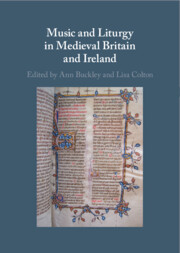Book contents
- Music and Liturgy in Medieval Britain and Ireland
- Music and Liturgy in Medieval Britain and Ireland
- Copyright page
- Contents
- Figures
- Tables
- Music Examples
- Contributors
- Acknowledgements
- Abbreviations
- Part I
- Part II
- Part III
- 10 Case Studies II: Textual Witnesses to Insular–Continental Networks
- 11 Nation, Identity, and the Liturgical Cult of St Katherine of Alexandria in Twelfth-Century England
- 12 The Dominicans and Their Identity in Medieval Britain and Ireland
- 13 Liturgy and Devotion in Insular Witnesses to the Cult of the Three Kings of Cologne
- 14 Epilogue
- List of Manuscripts
- Bibliography
- Index
14 - Epilogue
Pathways to Further Research in Medieval Insular Liturgies
from Part III
Published online by Cambridge University Press: 23 December 2021
- Music and Liturgy in Medieval Britain and Ireland
- Music and Liturgy in Medieval Britain and Ireland
- Copyright page
- Contents
- Figures
- Tables
- Music Examples
- Contributors
- Acknowledgements
- Abbreviations
- Part I
- Part II
- Part III
- 10 Case Studies II: Textual Witnesses to Insular–Continental Networks
- 11 Nation, Identity, and the Liturgical Cult of St Katherine of Alexandria in Twelfth-Century England
- 12 The Dominicans and Their Identity in Medieval Britain and Ireland
- 13 Liturgy and Devotion in Insular Witnesses to the Cult of the Three Kings of Cologne
- 14 Epilogue
- List of Manuscripts
- Bibliography
- Index
Summary
The written evidence considered in Music and Liturgy in Medieval Britain and Ireland has included sources of every type, from formal service books to informal additions, and from fragmentary manuscripts to early printed books. The picture that emerges is one of intersecting devotional cultures, both textual and practical: liturgy was constantly in development, open to adjustment, and affected by changes in international sacred customs as well as by local cultural interests and requirements. Furthermore, we have shown that though set apart geographically from the larger landmass of Continental Europe, Britain and Ireland were actively engaged in liturgical discourse through the constant travel of musicians, ecclesiastics, writers, books, relics, and via intellectual exchange, and rather than an agent of separation, the sea was in fact a connector of people.
- Type
- Chapter
- Information
- Music and Liturgy in Medieval Britain and Ireland , pp. 313 - 314Publisher: Cambridge University PressPrint publication year: 2022

